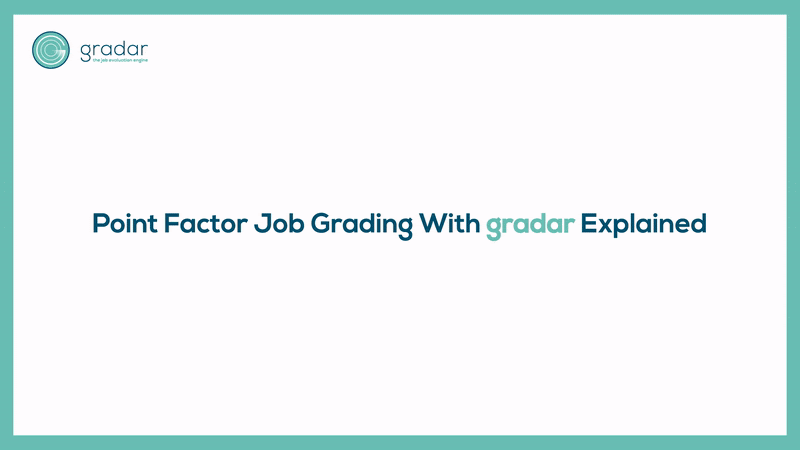Job Grading is an analytical form of job evaluation that combines points from factor levels with a predefined compensation grade structure.
With gradar, the next-generation job grading system, you can finally benefit from an intuitive and affordable service that leads the way in innovation and accessibility.

Job Grading is the main point-factor based job evaluation method
A job’s requirements are compared to the definition of each factor level, with points taken from the level that appears the best fit. The points are then added together to determine a total job score which is translated into an existing and often vendor-specific grade structure (also known as a grade map).
Experts, "Gurus"
Professionals
Skilled Labor
Un-skilled / Semi-skilled Labor
The Grade is a result of the project's dimensions: Timeframe, budget, leadership span, complexity, ...
General Management
Top Management
Middle Management
Supervisory
Management /
Team Leadership
Individual Contribution
Project Management
Management
Job Grading is the core method of analytical job evaluation. The requirements, responsibilities, and other aspects of a job - but not the position holder as a person - are evaluated with a set of standardized and generalized factors consisting of several levels.
Each factor is divided into a sequential hierarchy of levels, with descriptions of these levels available to provide guidance on which to select for the job to be evaluated. A minimum and maximum points score is allocated to each factor.
The number of levels may vary between factors as a more granular progression of requirements may be available. Not only that, but the points available may vary between different factors in accordance with beliefs about their relative significance.
Criticism of popular point-factor based job evaluation methods
Popular job grading systems from the 1950s show a rather strong management bias and were never meant to evaluate Individual Contributor jobs such as subject-matter expert roles or today’s broad selection of non-production jobs.
Another flaw of many of the outdated systems is that employees find them overly complicated and difficult to understand. They were only targeted at determining the price of labor instead of building the foundation for integrated job architectures with career paths and competency models.
Today, Job Grading is mainly used as another term for ‘analytical job evaluation’ with point-factor comparison and qualitative factor level descriptions. The resulting grade shows the relative value of the positions and does not need to have an immediate link to the price of labor.
gradar gets job grading ready for the 21st century
gradar is an analytical, point-factor based job grading system developed for modern day requirements. Focusing on agility, transparency, fairness and ease of use, gradar comes with a future-proof set of factors and career paths.
Our job grading is done within three dedicated career paths:
-
People Management
Management positions place their emphasis on the disciplinary management of employees and organizational units - as well as budget responsibility. Their achievements are typically of an indirect nature through leadership, promotion, support and motivation, alongside functional use of the resources available to achieve certain business objectives. -
Project Management
The core objective of project managers is the management of time-limited, one-off projects by coordinating, planning and distributing personnel, resources and budgets. -
Individual Contribution
Position holders contribute mainly through the application and development of specific skills. Professionals usually contribute individually or as members of an organizational unit. Responsibility may extend from the execution of individual tasks of an unskilled worker to the technical management of a discipline as an expert. Disciplinary leadership does not belong to the core tasks.
Individual Contribution
Professional Knowledge and Experience
Thinking and Cognitive Requirements / Problem Solving
People Responsibility
Organization Knowledge
Process and Complexity
Functional Responsibility
Scope of Decisions
Communication
Project Management
Project Responsibility and Leadership Span
Project Size and Project Budget
Management
Leadership Span and Guided Group of Employees
Processes and Complexity
Organizational Responsibility
Scope of Decisions
From unskilled workers to strategic experts, from project managers to people managers, gradar provides consistent, objective results on all job levels by following a strict requirements based approach.
This qualitative approach to job grading is one of our key characteristics. By providing clear factor definitions and distinctive verbal level descriptions, the grading process is easy to understand for everybody involved and provides a high level of objectivity.
The choice of factors makes gradar the ideal tool to evaluate positions in organizations of all sizes in all industry sectors - public or private. Our job matching module is a major timesaver for all compensation professionals, with more than 100 global job families allowing for the translation of grading results into job codes from numerous compensation surveys and labor agreements.
To ensure full compliance with local legislation, we provide an optional module for the analysis and evaluation of working conditions. This module can be customized and provides the data basis for fair and transparent allowance payment practices.
gradar gets job grading ready for the 21st century
gradar is an analytical, point-factor based job grading system developed for modern day requirements. Focusing on agility, transparency, fairness and ease of use, gradar comes with a future-proof set of factors and career paths.
Read more about Job Grading with gradar or sign up here for free.



